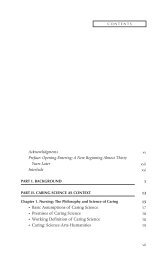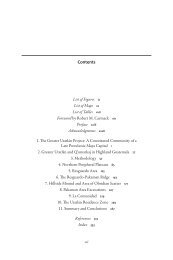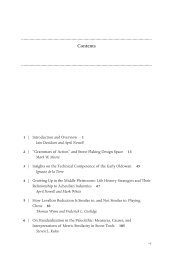free download - University Press of Colorado
free download - University Press of Colorado
free download - University Press of Colorado
Create successful ePaper yourself
Turn your PDF publications into a flip-book with our unique Google optimized e-Paper software.
Introduction<br />
chapter highlights some key features in human-environment relations and finishes<br />
with an interesting observation surrounding the apparent lack <strong>of</strong> planned<br />
mitigation strategies for volcanic eruptions in Iceland. This lack <strong>of</strong> preparation<br />
for volcanic eruptions is in contrast with the more established planning for the<br />
more common hazards created by periods <strong>of</strong> climatic variability. Therefore this<br />
research highlights the periodicity <strong>of</strong> disasters and the importance <strong>of</strong> potential<br />
parameters for predictability that enabled the development <strong>of</strong> successful mitigation<br />
strategies in Medieval Iceland. This focus on hazards arising from climate<br />
variability and periods <strong>of</strong> climate change is developed in the chapters that<br />
follow and provides interesting parallels with the themes <strong>of</strong> vulnerability, risk<br />
and mitigation, and the need for long-term studies <strong>of</strong> human ecodynamics.<br />
Chapter 4. Cooper brings the theme <strong>of</strong> accessing past ecological knowledge<br />
to the islands <strong>of</strong> the Caribbean. Island populations in this region have<br />
always been vulnerable to the dangers <strong>of</strong> sudden environmental change, given<br />
the region’s sensitivity to the highly variable climatic systems <strong>of</strong> the North<br />
Atlantic. This chapter reviews how 5,000 years <strong>of</strong> indigenous knowledge was<br />
effectively lost during the Colonial period, replaced primarily by Europeaninfluenced<br />
lifestyles that are not always well suited to environmental hazards<br />
in the region. Developing a regional interdisciplinary framework for the<br />
Caribbean, Cooper focuses on the impacts <strong>of</strong> cyclones, droughts, and floods<br />
caused by fluctuating climatic conditions and rising sea levels. By utilizing<br />
archaeological reconstructions <strong>of</strong> Precolumbian settlement locations, food<br />
procurement strategies, and household architecture designs, Cooper considers<br />
the relative resilience <strong>of</strong> Precolumbian lifeways that potentially provide useful<br />
mitigation strategies for the Caribbean today. Through a discussion <strong>of</strong> ethnohistorical<br />
evidence for Precolumbian belief systems, it is possible to evaluate<br />
Precolumbian traditional ecological knowledge and a detailed awareness <strong>of</strong> the<br />
different stages <strong>of</strong> hazard impact. This research leads us to question how the<br />
concept <strong>of</strong> vulnerability should be applied. In the Caribbean the frequency <strong>of</strong><br />
disasters highlights the importance <strong>of</strong> including the speed <strong>of</strong> reconstruction as<br />
part <strong>of</strong> a more comprehensive understanding <strong>of</strong> impact that looks beyond the<br />
event <strong>of</strong> the disaster itself and includes longer-term social and ecological processes.<br />
This chapter also discusses the potential implementation <strong>of</strong> improved<br />
disaster management strategies that employ past mitigation strategies using an<br />
example from an ongoing community project in northern Cuba.<br />
Chapter 5. Sandweiss and Quilter draw our attention to the central Andean<br />
coastline <strong>of</strong> South America and the threat <strong>of</strong> key hazards in the region exacerbated<br />
by the impacts <strong>of</strong> El Niño Southern Oscillation cycles. The authors<br />
develop an innovative approach to the challenges <strong>of</strong> collecting, collating, and<br />
comparing interdisciplinary data that operate at different temporal and spa-<br />
9





